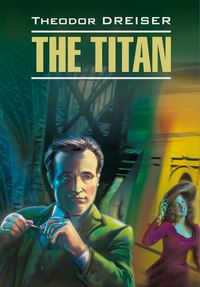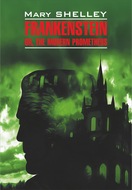Kitabı oku: «Titan / Титан. Книга для чтения на английском языке», sayfa 3
Chapter VII
Chicago Gas
Old Peter Laughlin, rejuvenated by Cowperwood’s electric ideas, was making money for the house. He brought many bits of interesting gossip from the floor25, and such shrewd guesses as to what certain groups and individuals were up to, that Cowperwood was able to make some very brilliant deductions. <…>
But this grain and commission business, while it was yielding a profit which would average about twenty thousand a year to each partner, was nothing more to Cowperwood than a source of information.
He wanted to “get in” on something that was sure to bring very great returns within a reasonable time and that would not leave him in any such desperate situation as he was at the time of the Chicago fire – spread out very thin, as he put it. He had interested in his ventures a small group of Chicago men who were watching him – Judah Addison, Alexander Rambaud, Millard Bailey, Anton Videra – men who, although not supreme figures by any means, had free capital. He knew that he could go to them with any truly sound proposition. The one thing that most attracted his attention was the Chicago gas situation, because there was a chance to step in almost unheralded in an as yet unoccupied territory; with franchises once secured – the reader can quite imagine how – he could present himself, like a Hamilcar Barca in the heart of Spain or a Hannibal at the gates of Rome26, with a demand for surrender and a division of spoils.
There were at this time three gas companies operating in the three different divisions of the city – the three sections, or “sides,” as they were called – South, West, and North, and of these the Chicago Gas, Light, and Coke Company, organized in 1848 to do business on the South Side, was the most flourishing and important. The People’s Gas, Light, and Coke Company, doing business on the West Side, was a few years younger than the South Chicago company, and had been allowed to spring into existence through the foolish self-confidence of the organizer and directors of the South Side company, who had fancied that neither the West Side nor the North Side was going to develop very rapidly for a number of years to come, and had counted on the city council’s allowing them to extend their mains at any time to these other portions of the city. A third company, the North Chicago Gas Illuminating Company, had been organized almost simultaneously with the West Side company by the same process through which the other companies had been brought into life – their avowed intention, like that of the West Side company, being to confine their activities to the sections from which the organizers presumably came.
Cowperwood’s first project was to buy out and combine the three old city companies. With this in view he looked up the holders in all three corporations – their financial and social status. It was his idea that by offering them three for one, or even four for one, for every dollar represented by the market value of their stock he might buy in and capitalize the three companies as one. Then, by issuing sufficient stock to cover all his obligations, he would reap a rich harvest and at the same time leave himself in charge. He approached Judah Addison first as the most available man to help float a scheme of this kind. He did not want him as a partner so much as he wanted him as an investor.
“Well, I’ll tell you how I feel about this,” said Addison, finally. “You’ve hit on a great idea here. It’s a wonder it hasn’t occurred to someone else before. And you’ll want to keep rather quiet about it, or someone else will rush in and do it. We have a lot of venturesome men out here. But I like you, and I’m with you. Now it wouldn’t be advisable for me to go in on this personally – not openly, anyhow – but I’ll promise to see that you get some of the money you want. I like your idea of a central holding company, or pool, with you in charge as trustee, and I’m perfectly willing that you should manage it, for I think you can do it. Anyhow, that leaves me out, apparently, except as an Investor. But you will have to get two or three others to help carry this guarantee with me. Have you anyone in mind?”
“Oh yes,” replied Cowperwood. “Certainly. I merely came to you first.” He mentioned Rambaud, Videra, Bailey, and others.
“They’re all right,” said Addison, “if you can get them. But I’m not sure, even then, that you can induce these other fellows to sell out. They’re not investors in the ordinary sense. They’re people who look on this gas business as their private business. They started it. They like it. They built the gas-tanks and laid the mains. It won’t be easy.”
Cowperwood found, as Addison predicted, that it was not such an easy matter to induce the various stockholders and directors in the old companies to come in on any such scheme of reorganization. A closer, more unresponsive set of men he was satisfied he had never met. His offer to buy outright at three or four for one they refused absolutely. The stock in each case was selling from one hundred and seventy to two hundred and ten, and intrinsically was worth more every year, as the city was growing larger and its need of gas greater. At the same time they were suspicious – one and all – of any combination scheme by an outsider. Who was he? Whom did he represent? He could make it clear that he had ample capital, but not who his backers were. The old officers and directors fancied that it was a scheme on the part of some of the officers and directors of one of the other companies to get control and oust them. Why should they sell? Why be tempted by greater profits from their stock when they were doing very well as it was? Because of his newness to Chicago and his lack of connection as yet with large affairs Cowperwood was eventually compelled to turn to another scheme – that of organizing new companies in the suburbs as an entering-wedge of attack upon the city proper. Suburbs such as Lake View and Hyde Park, having town or village councils of their own, were permitted to grant franchises to water, gas, and street-railway companies duly incorporated under the laws of the state. Cowperwood calculated that if he could form separate and seemingly distinct companies for each of the villages and towns, and one general company for the city later, he would be in a position to dictate terms to the older organizations. It was simply a question of obtaining his charters and franchises before his rivals had awakened to the situation.
The one difficulty was that he knew absolutely nothing of the business of gas – its practical manufacture and distribution – and had never been particularly interested in it. Street-railroading, his favorite form of municipal profit-seeking, and one upon which he had acquired an almost endless fund of specialized information, offered no present practical opportunity for him here in Chicago. He meditated on the situation, did some reading on the manufacture of gas, and then suddenly, as was his luck, found an implement ready to his hand.
It appeared that in the course of the life and growth of the South Side company there had once been a smaller organization founded by a man by the name of Sippens – Henry De Soto Sippens – who had entered and actually secured, by some hocus-pocus27, a franchise to manufacture and sell gas in the down-town districts, but who had been annoyed by all sorts of legal processes until he had finally been driven out or persuaded to get out. He was now in the real-estate business in Lake View. Old Peter Laughlin knew him.
“He’s a smart little cuss,” Laughlin told Cowperwood. “I thought once he’d make a go of it, but they ketched him where his hair was short, and he had to let go.28 There was an explosion in his tank over here near the river onct, an I think he thort them fellers blew him up. Anyhow, he got out. I ain’t seen ner heard sight of him fer years.”
Cowperwood sent old Peter to look up Mr. Sippens and find out what he was really doing, and whether he would be interested to get back in the gas business. Enter, then, a few days later into the office of Peter Laughlin & Co. Henry De Soto Sippens. He was a very little man, about fifty years of age; he wore a high, four-cornered, stiff felt hat, with a short brown business coat (which in summer became seersucker) and square-toed shoes; he looked for all the world like a country drug or book store owner, with perhaps the air of a country doctor or lawyer superadded. His cuffs protruded too far from his coat-sleeves, his necktie bulged too far out of his vest, and his high hat was set a little too far back on his forehead; otherwise he was acceptable, pleasant, and interesting. He had short side-burns – reddish brown – which stuck out quite defiantly, and his eyebrows were heavy.
“Mr. Sippens,” said Cowperwood, blandly, “you were once in the gas manufacturing and distributing business here in Chicago, weren’t you?”
“I think I know as much about the manufacture of gas as anyone,” replied Sippens, almost contentiously. “I worked at it for a number of years.”
“Well, now, Mr. Sippens, I was thinking that it might be interesting to start a little gas company in one of these outlying villages that are growing so fast and see if we couldn’t make some money out of it. I’m not a practical gas man myself, but I thought I might interest someone who was.” He looked at Sippens in a friendly, estimating way. “I have heard of you as someone who has had considerable experience in this field here in Chicago. If I should get up a company of this kind, with considerable backing, do you think you might be willing to take the management of it?”
“Oh, I know all about this gas field,” Mr. Sippens was about to say. “It can’t be done.” But he changed his mind before opening his lips. “If I were paid enough,” he said, cautiously. “I suppose you know what you have to contend with?”
“Oh yes,” Cowperwood replied, smiling. “What would you consider ‘paid enough’ to mean?”
“Oh, if I were given six thousand a year and a sufficient interest in the company – say, a half, or something like that – I might consider it,” replied Sippens, determined, as he thought, to frighten Cowperwood off by his exorbitant demands. He was making almost six thousand dollars a year out of his present business.
“You wouldn’t think that four thousand in several companies – say up to fifteen thousand dollars – and an interest of about a tenth in each would be better?”
Mr. Sippens meditated carefully on this. Plainly, the man before him was no trifling beginner. He looked at Cowperwood shrewdly and saw at once, without any additional explanation of any kind, that the latter was preparing a big fight of some sort. Ten years before Sippens had sensed the immense possibilities of the gas business. He had tried to “get in on it,”29 but had been sued, waylaid, enjoined, financially blockaded, and finally blown up. He had always resented the treatment he had received, and he had bitterly regretted his inability to retaliate. He had thought his days of financial effort were over, but here was a man who was subtly suggesting a stirring fight, and who was calling him, like a hunter with horn, to the chase.
“Well, Mr. Cowperwood,” he replied, with less defiance and more camaraderie, “if you could show me that you have a legitimate proposition in hand I am a practical gas man. I know all about mains, franchise contracts, and gas-machinery. I organized and installed the plant at Dayton, Ohio, and Rochester, New York. I would have been rich if I had got here a little earlier.” The echo of regret was in his voice.
“Well, now, here’s your chance, Mr. Sippens,” urged Cowperwood, subtly. “Between you and me there’s going to be a big new gas company in the field. We’ll make these old fellows step up and see us quickly. Doesn’t that interest you? There’ll be plenty of money. It isn’t that that’s wanting – it’s an organizer, a fighter, a practical gas man to build the plant, lay the mains, and so on.” Cowperwood rose suddenly, straight and determined – a trick with him when he wanted to really impress anyone. He seemed to radiate force, conquest, victory. “Do you want to come in?”
“Yes, I do, Mr. Cowperwood!” exclaimed Sippens, jumping to his feet, putting on his hat and shoving it far back on his head. He looked like a chest-swollen bantam rooster.
Cowperwood took his extended hand.
“Get your real-estate affairs in order. I’ll want you to get me a franchise in Lake View shortly and build me a plant. I’ll give you all the help you need. I’ll arrange everything to your satisfaction within a week or so. We will want a good lawyer or two.”
Sippens smiled ecstatically as he left the office. Oh, the wonder of this, and after ten years! Now he would show those crooks. Now he had a real fighter behind him – a man like himself. Now, by George,30 the fur would begin to fly! Who was this man, anyhow? What a wonder! He would look him up. He knew that from now on he would do almost anything Cowperwood wanted him to do.
Chapter VIII
Now This Is Fighting
When Cowperwood, after failing in his overtures to the three city gas companies, confided to Addison his plan of organizing rival companies in the suburbs, the banker glared at him appreciatively. “You’re a smart one!” he finally exclaimed. “You’ll do! I back you to win!” He went on to advise Cowperwood that he would need the assistance of some of the strong men on the various village councils. “They’re all as crooked as eels’ teeth,” he went on. “But there are one or two that are more crooked than others and safer – bell-wethers31. Have you got your lawyer?”
“I haven’t picked one yet, but I will. I’m looking around for the right man now.”
“Well, of course, I needn’t tell you how important that is. There is one man, old General Van Sickle, who has had considerable training in these matters. He’s fairly reliable.”
The entrance of Gen. Judson P. Van Sickle threw at the very outset a suggestive light on the whole situation. The old soldier, over fifty, had been a general of division during the Civil War, and had got his real start in life by filing false titles to property in southern Illinois, and then bringing suits to substantiate his fraudulent claims before friendly associates32. He was now a prosperous go-between, requiring heavy retainers33, and yet not over-prosperous. There was only one kind of business that came to the General – this kind; and one instinctively compared him to that decoy sheep at the stock-yards that had been trained to go forth into nervous, frightened flocks of its fellow-sheep, balking at being driven into the slaughtering-pens, and lead them peacefully into the shambles, knowing enough always to make his own way quietly to the rear during the onward progress and thus escape. A dusty old lawyer, this, with Heaven knows what welter of altered wills, broken promises, suborned juries, influenced judges, bribed councilmen and legislators, double-intentioned agreements and contracts, and a whole world of shifty legal calculations and false pretenses floating around in his brain. Among the politicians, judges, and lawyers generally, by reason of past useful services, he was supposed to have some powerful connections. He liked to be called into any case largely because it meant something to do and kept him from being bored. When compelled to keep an appointment in winter, he would slip on an old greatcoat of gray twill that he had worn until it was shabby, then, taking down a soft felt hat, twisted and pulled out of shape by use, he would pull it low over his dull gray eyes and amble forth. In summer his clothes looked as crinkled as though he had slept in them for weeks. He smoked. In cast of countenance he was not wholly unlike General Grant34, with a short gray beard and mustache which always seemed more or less unkempt and hair that hung down over his forehead in a gray mass. The poor General! He was neither very happy nor very unhappy – a doubting Thomas35 without faith or hope in humanity and without any particular affection for anybody. <…>
The energetic Sippens came after a few moments, and he and Van Sickle, after being instructed to be mutually helpful and to keep Cowperwood’s name out of all matters relating to this work, departed together. They were an odd pair – the dusty old General phlegmatic, disillusioned, useful, but not inclined to feel so; and the smart, chipper Sippens, determined to wreak a kind of poetic vengeance on his old-time enemy, the South Side Gas Company, via this seemingly remote Northside conspiracy. In ten minutes they were hand in glove36, the General describing to Sippens the penurious and unscrupulous brand of Councilman Duniway’s politics and the friendly but expensive character of Jacob Gerecht. Such is life.
In the organization of the Hyde Park company Cowperwood, because he never cared to put all his eggs in one basket, decided to secure a second lawyer and a second dummy president, although he proposed to keep De Soto Sippens as general practical adviser for all three or four companies. He was thinking this matter over when there appeared on the scene a very much younger man than the old General, one Kent Barrows McKibben, the only son of ex-Judge Marshall Scammon McKibben, of the State Supreme Court. Kent McKibben was thirty-three years old, tall, athletic, and, after a fashion, handsome. He was not at all vague intellectually – that is, in the matter of the conduct of his business – but dandified and at times remote. He had an office in one of the best blocks in Dearborn Street, which he reached in a reserved, speculative mood every morning at nine, unless something important called him down-town earlier. It so happened that he had drawn up the deeds and agreements for the real-estate company that sold Cowperwood his lots at Thirty-seventh Street and Michigan Avenue, and when they were ready he journeyed to the latter’s office to ask if there were any additional details which Cowperwood might want to have taken into consideration. When he was ushered in, Cowperwood turned to him his keen, analytical eyes and saw at once a personality he liked. McKibben was just remote and artistic enough to suit him. He liked his clothes, his agnostic unreadableness, his social air. McKibben, on his part, caught the significance of the superior financial atmosphere at once. He noted Cowperwood’s light-brown suit picked out with strands of red, his maroon tie, and small cameo cuff-links. His desk, glass-covered, looked clean and official. The woodwork of the rooms was all cherry, hand-rubbed and oiled, the pictures interesting steel-engravings of American life, appropriately framed. The typewriter – at that time just introduced – was in evidence, and the stock-ticker – also new – was ticking volubly the prices current. The secretary who waited on Cowperwood was a young Polish girl named Antoinette Nowak, reserved, seemingly astute, dark, and very attractive.
“What sort of business is it you handle, Mr. McKibben?” asked Cowperwood, quite casually, in the course of the conversation. And after listening to McKibben’s explanation he added, idly: “You might come and see me some time next week. It is just possible that I may have something in your line.”
In another man McKibben would have resented this remote suggestion of future aid. Now, instead, he was intensely pleased. The man before him gripped his imagination. His remote intellectuality relaxed. When he came again and Cowperwood indicated the nature of the work he might wish to have done McKibben rose to the bait like a fish to a fly.
“I wish you would let me undertake that, Mr. Cowperwood,” he said, quite eagerly. “It’s something I’ve never done, but I’m satisfied I can do it. I live out in Hyde Park and know most of the councilmen. I can bring considerable influence to bear for you.”
Cowperwood smiled pleasantly.
So a second company, officered by dummies of McKibben’s selection, was organized. De Soto Sippens, without old General Van Sickle’s knowledge, was taken in as practical adviser. An application for a franchise was drawn up, and Kent Barrows McKibben began silent, polite work on the South Side, coming into the confidence, by degrees, of the various councilmen.
There was still a third lawyer, Burton Stimson, the youngest but assuredly not the least able of the three, a pale, dark-haired Romeoish youth with burning eyes, whom Cowperwood had encountered doing some little work for Laughlin, and who was engaged to work on the West Side with old Laughlin as ostensible organizer and the sprightly De Soto Sippens as practical adviser. Stimson was no mooning Romeo, however, but an eager, incisive soul, born very poor, eager to advance himself. Cowperwood detected that pliability of intellect which, while it might spell disaster to some, spelled success for him. He wanted the intellectual servants. He was willing to pay them handsomely, to keep them busy, to treat them with almost princely courtesy, but he must have the utmost loyalty. Stimson, while maintaining his calm and reserve, could have kissed the archepiscopal hand. Such is the subtlety of contact.
Behold then at once on the North Side, the South Side, the West Side – dark goings to and fro and walk-ings up and down in the earth. In Lake View old General Van Sickle and De Soto Sippens, conferring with shrewd Councilman Duniway, druggist, and with Jacob Gerecht, ward boss and wholesale butcher, both of whom were agreeable but exacting, holding pleasant back-room and drug-store confabs with almost tabulated details of rewards and benefits. In Hyde Park, Mr. Kent Barrows McKibben, smug and well dressed, a Chesterfield37 among lawyers, and with him one J. J. Bergdoll, a noble hireling, long-haired and dusty, ostensibly president of the Hyde Park Gas and Fuel Company, conferring with Councilman Alfred B. Davis, manufacturer of willow and rattan ware, and Mr. Patrick Gilgan, saloon-keeper, arranging a prospective distribution of shares, offering certain cash consideration, lots, favors, and the like. Observe also in the village of Douglas and West Park on the West Side, just over the city line, the angular, humorous Peter Laughlin and Burton Stimson arranging a similar deal or deals.
The enemy, the city gas companies, being divided into three factions, were in no way prepared for what was now coming. When the news finally leaked out that applications for franchises had been made to the several corporate village bodies each old company suspected the other of invasion, treachery, robbery. Pettifogging lawyers were sent, one by each company, to the village council in each particular territory involved, but no one of the companies had as yet the slightest idea who was back of it all or of the general plan of operations. Before anyone of them could reasonably protest, before it could decide that it was willing to pay a very great deal to have the suburb adjacent to its particular territory left free, before it could organize a legal fight, councilmanic ordinances were introduced giving the applying company what it sought; and after a single reading in each case and one open hearing, as the law compelled, they were almost unanimously passed. There were loud cries of dismay from minor suburban papers which had almost been forgotten in the arrangement of rewards. The large city newspapers cared little at first, seeing these were outlying districts; they merely made the comment that the villages were beginning well, following in the steps of the city council in its distinguished career of crime. <…>
He worked on plans with Sippens looking to the actual introduction of gas-plants. <…>
the floor – (зд.) операционный зал фондовой биржи
[Закрыть]
Hamilcar Barca in the heart of Spain or a Hannibal at the gates of Rome – Гамилькар Барка (около 279—229 гг. до н. э.), карфагенский генерал и государственный деятель, отец Ганнибала, после окончания Первой Пунической войны инициировал начало завоевания Карфагеном Испании; Ганнибал (247— 183 до н. э.), один из величайших полководцев и государственных мужей древности, участник Второй Пунической войны, в ходе которой его армия дошла практически до самого Рима
[Закрыть]
by some hocus-pocus – (разг.) в результате каких-то махинаций
[Закрыть]
I thought once he’d make a go of it, but they ketched him where his hair was short, and he had to let go. – Было время, я думал, что он добьется успеха, но они прижали его (нашли его слабое место), и ему пришлось выпустить лакомый кусочек.
[Закрыть]
to get in on it – (сленг) поучаствовать в этом, поработать в этой сфере
[Закрыть]
by George! – (разг.) ей-богу!, честное слово!
[Закрыть]
bell-wether – (перен.) вожак, лидер (прямое значение баран-вожак, на которого вешают бубенчик, чтобы он вел стадо)
[Закрыть]
had got his real start in life by filing false titles to property in southern Illinois, and then bringing suits to substantiate his fraudulent claims before friendly associates – он приобрел славу тем, что составлял фиктивные документы на право владения землей в южном Иллинойсе, а затем, чтобы узаконить мошенничество, подавал в суд, в котором заседали его приятели и сообщники, и выигрывал дело
[Закрыть]
requiring heavy retainers – требующий солидный гонорар
[Закрыть]
In cast of countenance he was not wholly unlike General Grant – Лицом он даже немного напоминал генерала Гранта (Улисс Симпсон Грант (1822—1885), американский политический и военный деятель, полководец северян в годы Гражданской войны в США, генерал армии. C 1869 по 1877 – 18-й президент США)
[Закрыть]
a doubting Thomas – (библ.) Фома неверующий
[Закрыть]
were hand in glove – (разг.) нашли общий язык, спелись
[Закрыть]
a Chesterfield – (зд,) аристократ (Филип Дормер Стенхоп, 4-й граф Честерфилд (1694—1773), английский государственный деятель, дипломат и писатель)
[Закрыть]








